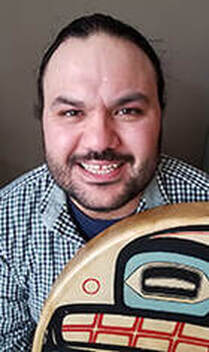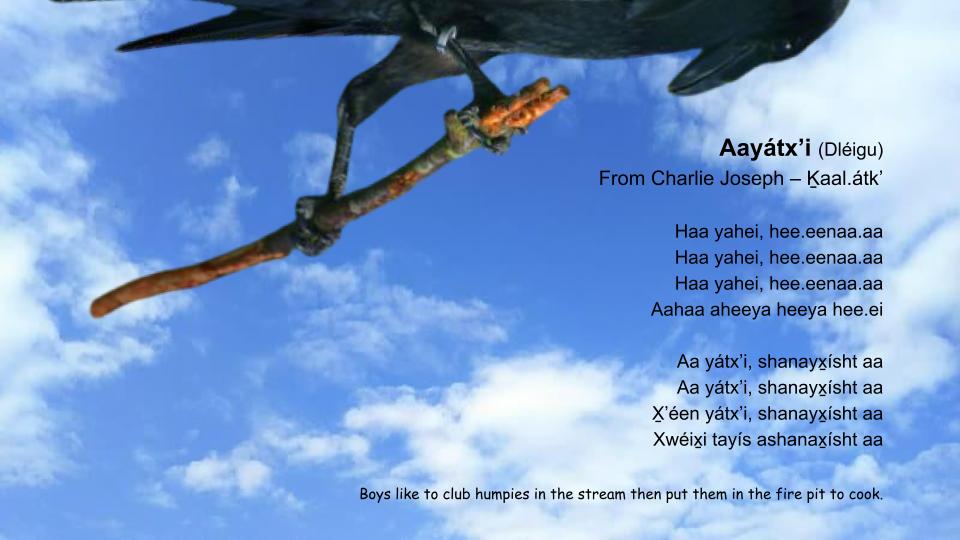|
Ed Shaaḵindustoow Littlefield is a freelance percussionist and educator who has worked with our students in the past through Sealaska Heritage Instituteʼs Voices on the Land project. Ed performs in many ensembles of different genres around the Northwest.
He has released two albums featuring his traditional Native melodies with his group, Native Jazz Quartet: Walking Between Worlds and N J Q: Stories. Recently he recorded Lingít lullabies as part of Cradle Songs of Southeast Alaska. Ed created this series of videos for our JAMM students! Gunalchéesh! JAMM thanks the Department of Education and Early Development for providing Covid relief funds to develop tutorials that students anywhere, anytime can access free of charge. JAMM is grateful for DEED’s support, which has helped JAMM continue to provide high quality learning opportunities that are equitable and accessible this year." |
|
Video 1: Remember Who You Are
|
Video 2: Our Words are Like Feathers
|
Video 3: Jazz and Lingít Merge
|
|
Video 4: Clapping Exercises
|
Video 5: Ed Shares His Writing Process
|
Lingít Language Learning thru Rhythm & Movement
|
As part of the language learning process, Ed Shaaḵindustoow Littlefield incorporates movement and drum patterns to encourage students to act out the Lingít feeling phrases without ever hearing the direct translation in English. The video on the left is an example of why Ed is in such demand as a teaching artist. Each drum pattern reflects a feeling phrase as Ed takes the students through a series of feelings: first waking up without eating breakfast, stomach growling (I am hungry), feeling great after eating (I am happy), wanting to lay down after eating too much (I am sleepy) and walking like a leader. Ed also shared his work as a professional musician & composer by giving the kids an inside look into A Tlingit Christmas Carol.
|
|
Aayátxʼi
|
Dléigus or "childrenʼs lullabies" are a group of Lingít songs that are not owned by any clan. These songs might come from a certain family, but the composer is unknown. This means that anyone can sing them without asking clan permission. The lullabies shared by Charlie Joseph, Sr. Ḵaal.átkʼ came from generations of parents and grandparents – and shared among communities. Charlie taught and recorded 12 of these lullabies because his daughter, Ethel, who was trying to teach the language, found that these songs were much easier for children to learn than the more difficult clan songs. Traditionally the songs were sung without a drum, but Charlie put a drum beat to them to help the children learn traditional rhythms. Gunalchéesh, Roby Littlefield (Edʼs mom), for providing the history of these songs, including Charlie Joseph Ḵaalʼátkʼs role in the 1980 first Sealaska Elders Conference, held in Sitka.
|
|
Aayátxʼi is one of the 12 lullabies that Charlie taught and recorded. We sing this song when Raven clubs King Salmon because the lyric translation is "Boys like to club humpies in the stream then put them in the fire pit to cook." Gunalchéesh, Ed Littlefield, for recording this song and teaching it to our students.
Ed is a composer and arranger, often fusing jazz elements with Native music. He completed an album combining traditional Alaskan Native music with jazz called “Walking Between Worlds” and Aayátxʼ is one of them. Listen to this youtube video, which begins with Ed singing the traditional dléigu before transitioning to his jazz version. Performed by Ed Littlefield & the Native Jazz Trio. |
Aayátxʼ: Ed Littlefield and the Native Jazz Trio
|


